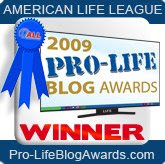There is no better example of this distortion of science than the language the United States Supreme Court cited in striking down Nebraska’s ban on partial-birth abortion in 2000. This language purported to come from a “select panel” of the American College of Obstetricians and Gynecologists (ACOG), a supposedly nonpartisan physicians’ group. ACOG declared that the partial-birth-abortion procedure “may be the best or most appropriate procedure in a particular circumstance to save the life or preserve the health of a woman.” The Court relied on the ACOG statement as a key example of medical opinion supporting the abortion method.Instead of believing that parital-birth abortion "may be the best or most appropriate procedure in a particular circumstance" the panel's original statement said they, "could identify no circumstances under which this procedure . . . would be the only option to save the life or preserve the health of the woman."
Years later, when President Bush signed a federal partial-birth-abortion ban (something President Clinton had vetoed), the ACOG official policy statement was front and center in the attack on the legislation. U.S. District Court Judge Richard Kopf, one of the three federal judges that issued orders enjoining the federal ban (later overturned by theSupreme Court), devoted more than 15 pages of his lengthy opinion to ACOG’s policy statement and the integrity of the process that led to it.
Like the Supreme Court majority in the prior dispute over the Nebraska ban, Judge Kopf asserted that the ACOG policy statement was entitled to judicial deference because it was the result of an inscrutable collaborative process among expert medical professionals. “Before and during the task force meeting,” he concluded, “neither ACOG nor the task force members conversed with other individuals or organizations, including congressmen and doctors who provided congressional testimony, concerning the topics addressed” in the ACOG statement.
In other words, what medical science has pronounced, let no court dare question. The problem is that the critical language of the ACOG statement was not drafted by scientists and doctors. Rather, it was inserted into ACOG’spolicy statement at the suggestion of then–Clinton White House policy adviser Elena Kagan.
That language by itself (which would have basically destroyed the pro-choice case for partial-birth abortion) didn't sit well with Kagan who thought such a statement "would be a disaster." So she suggested the ACOG add the "may be the best" clause and they did, word for word.
Yuval Levin writes,
What’s described in these memos is easily the most serious and flagrant violation of the boundary between scientific expertise and politics I have ever encountered. A White House official formulating a substantive policy position for a supposedly impartial physicians’ group, and a position at odds with what that group’s own policy committee had actually concluded? You have to wonder where all the defenders of science—those intrepid guardians of the freedom of inquiry who throughout the Bush years wailed about the supposed politicization of scientific research and expertise—are now. If the Bush White House (in which I served as adomestic policy staffer) had ever done anything even close to this it would have been declared a monumental scandal, and rightly so.This is why I don't trust unverified information from abortion promoting groups like the ACOG. If you don't have a problem with the killing of a human child who is more born than unborn then why would you have a problem with lying?





No comments:
Post a Comment